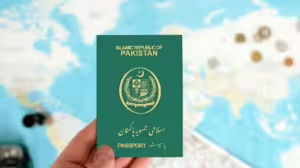Islamabad, Dec 2: The Foreign Office (FO) said Monday that Prime Minister Shehbaz Sharif will go to Riyadh on December 3–4 to attend the “One Water Summit”. Islamabad and Riyadh have a long history of fraternal ties and collaboration in a variety of fields, including trade, culture, economics, and defense. The prime minister will be in the Kingdom for the fifth time this year.
“Through high-level political commitments, the Summit, a joint initiative of Saudi Arabia, France, Kazakhstan, and the World Bank, aims to promote global cooperation and a coherent international approach towards water resource management,” the statement said.
According to the announcement, PM Shehbaz will be the keynote speaker at a roundtable discussion on wetlands and freshwater resource adaptation, preservation, and restoration. It further stated, “He will also highlight the actions Pakistan is taking to encourage water conservation, improve water quality, strengthen climate resilience, create livelihoods, and conserve biodiversity.”
In order to address the effects of climate-induced floods, unpredictable and extreme weather patterns, and heat stress on water resources and ecosystems, the prime minister will “underline the importance of international cooperation,” according to the FO.
According to the announcement, PM Shebaz would also urge “meaningful international collaboration for sustainable water resource management.” “The prime minister is anticipated to hold bilateral meetings and engagements on the sidelines of the summit.”
Earlier today, the prime minister praised the two countries’ long-standing friendship and expressed his delight with the advancements in Saudi Arabian-Pakistani cooperation and investment initiatives.
The prime minister, who presided over a review meeting, emphasized the strategic partnership between Saudi Arabia and Pakistan by pointing out that the two nations’ cooperation has been expanding in a number of areas.
“We are dedicated to strengthening our partnership with Saudi Arabia, which has been a dependable ally during Pakistan’s difficult times,” PM Shehbaz stated. A briefing on the impressive advancements of bilateral investments was also part of the conference.
At the second meeting of the Pakistan-Saudi Arabia Joint Task Force, which took place last month, the participants were given an update on the status of bilateral cooperation in a number of areas.
They were told that in a short period of time, 34 memorandums of understanding (MOUs) had been signed by both nations, seven of which had already been formalized into deals worth $560 million. When PM Shehbaz spoke at the Arab-Islamic Summit in Riyadh earlier this month, he reiterated Pakistan’s “unwavering support” for the Palestinian people while condemning Israeli aggression in Gaza, Lebanon, and Iran.
The prime minister traveled to Riyadh in October to attend the ninth Future Investment Initiative (FII), a two-day event. The FII, which was set for October 29–30, provided a significant forum for nations to showcase their economic potential, draw in international capital, and talk about sustainable growth tactics.
In the meantime, PM Shehbaz visited Saudi Arabia for the first time since taking office this year in April. He and Crown Prince Salman had decided to speed up the initial phase of a $5 billion Saudi investment package for Pakistan during the visit.
The Saudi Press Agency said the action reaffirmed Saudi Arabia’s commitment to bolstering Pakistan’s economy and its “sisterly people.” PM Shehbaz promised Saudi investors that the Special Investment and Facilitation Council (SIFC) would provide them with the best facilities and ease of doing business when a Saudi delegation visited Pakistan in May.
In addition to having close bilateral relations, the Kingdom has frequently supported Pakistan in difficult economic times. To enable the nation access a $3 billion rescue package from the International Monetary Fund (IMF), Riyadh deposited $2 billion in the State Bank of Pakistan (SBP) in June of last year. To save the nation from going into sovereign default, the loan was essential.









